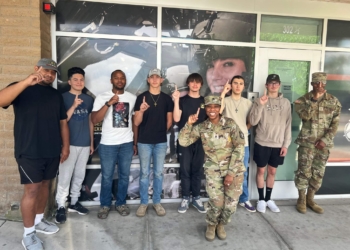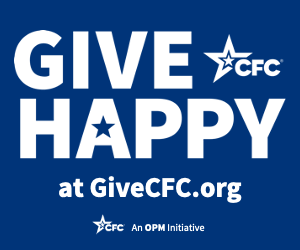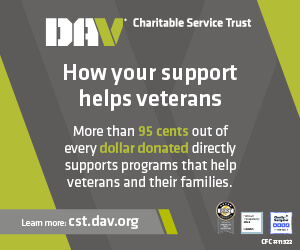With so many areas of military life outside their control, career development may feel like one more worry to heap onto military spouses. However, learning what resources are available to achieve strategic career development can put this demographic one step closer to employment.
On day one of a new job, military spouses start an internal countdown. They know that in two to three years they will have to have the “we have orders” conversation. Getting hired after presenting a resume with an overabundance of twists and turns is no small feat, but only the first battle in the campaign that is military spouse career development. Luckily, the lifestyle that puts military spouse careers to the test also uniquely equips them to leverage their less-than-traditional backgrounds and make their status as military spouses work for them.
Navigating your own path

Although military spouses have military-sponsored career development resources at their disposal, many prefer to go their own way. When the Navy sent Kristina Sevier and her husband to the remote island of Guam in 2008, job opportunities in her field were very limited. Rather than accepting a resume gap as a natural part of military spouse life, she created her own flower delivery company.
“In Guam, a lot of people are forward deployed so I started a subscription plan so while they were deployed their significant other would receive flower deliveries in their absence,” she explained.
This required a lot of research, a business license and connections with wholesalers, she says, along with getting active in the community. Through her personal and professional relationships, she was able to see a gap in the marketplace and create her own opportunities.
“As a military spouse we are entrepreneurs anyway. We are creative and try to figure out how to make things work in trying to balance our family business,” Sevier said.
Upon returning to the U.S., Sevier hit the ground running, leveraging her successful startup to advance within the financial arena and is currently working toward becoming a team financial advisor with Merrill Lynch.
Once military spouses get their foot in the door, many feel grateful just to have gotten a job. Sevier combats this tendency by making concerted efforts to know her worth and ask for compensation that lines up with her level of experience and work ethic.
“Women are grossly underpaid in the workforce compared to men’s salaries. For military spouses it is like a compounding effect. We are paid less than our civilian counterparts because we don’t have the same tenure and consistency within the same company and fields,” she said.
Sevier encourages spouses to be prepared. Compare salaries of similar roles on glassdoor.com. The worst that can happen is they say no.
Networking
Networking is a buzzword usually associated with social networking. However, social networking is not as effective when it comes to career development.
“Eighty-percent of jobs are filled by referral. … So building out that network in advance is one of the key pieces. You have to be an active participant in advocating for yourself,” Elizabeth O’Brien, Senior Director of Military Spouse Program at Hiring Our Heroes, said.
While making connections on social networking sites, like LinkedIn, are an asset, relationships need to be developed on a personal level, not exclusively a social (media) level. The moments that employers remember are not the clever tweets, but the ones where individuals show up and prove themselves through face-to-face interactions and sweat equity.
Hiring partners

With increased awareness of the value military spouses bring to the workforce, having hard conversations with employers doesn’t have to be a career killer.
“If a company has created an opportunity for you to self-identify it means that they are invested in hiring our [military spouse] population,” O’Brien said. “They have to clear many legal hurdles to actually have that as an opportunity because we are asking someone to identify based on marital status,” which is against the law for a company to discuss during the hiring process.
Companies like Starbucks, Google and Amazon are leading the charge to improve military spouse hiring but are still finalizing details on how to manage and develop this newly acquired talent.
What remains unclear is who is benefitting from these military spouse hiring initiatives. According to O’Brien, there are two groups of military spouses who want to work.
“There is the 18-24 year old bucket — that’s representative of the larger military. They are just starting out with a wide variety of entry level jobs. And then we see folks when they are around 32+ bucket and that is the spouse whose active duty service member has decided to stay in and they need to figure out a path.”
Federal employment
For military spouses who utilize military spouse preference and find federal employment through USAJobs.com, there are a plethora of military spouse-friendly career development opportunities.
- Flexible work schedules: break from the traditional 0800 – 1700 Monday – Friday model
- Telework: some jobs have the flexibility to work from home on a case-by-case basis
- Wellness time: don’t have time to squeeze in a workout? Some agencies offer paid time away from the office to devote to health and wellness
- Tenure possibilities: transfer to another federal job and your benefits transfer with you
For those who need extra assistance, “some agencies have adopted a wider version of the Employee Assistance Program. This program can help veterans, spouses and all employees as they transition through various times in their careers,” said an unnamed Office of Personnel Management official during a phone interview. Though originally designed to help employees through personal struggles, like alcohol abuse, this program has morphed into another confidential resource for federal employees to help mitigate the unexpected challenges of life.
Military spouses anticipate problems through resilience in the face of PCS moves, longer-than-planned deployments and pressing the reset button every few years. All that remains is for them to plot their course and see where the wind will take them.
Resources to add to your toolbox
LinkedIn Premium for free: https://myseco.militaryonesource.mil/portal/content/view/8256
Free career mentorship programs: MySECO – Military OneSource, American Corporate Partners (ACP) and Hiring our Heroes
Read comments

















































